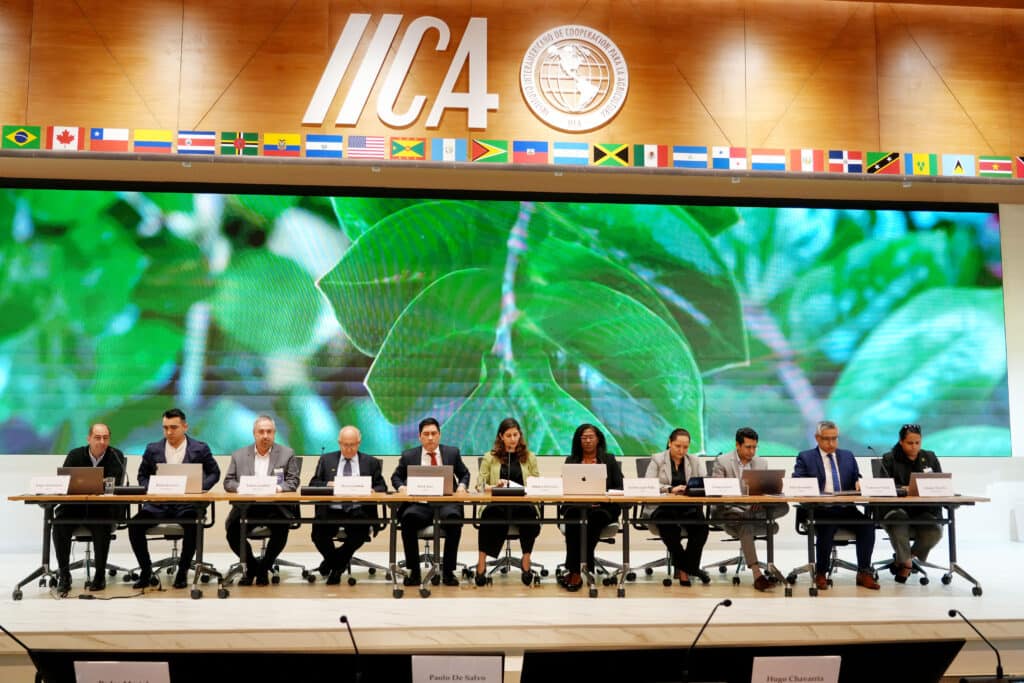
San Jose, 13 October 2025 (IICA) – A group of experts and representatives of governments, international agencies and the private and academic sectors gathered at the Headquarters of the Inter-American Institute for Cooperation on Agriculture (IICA) in Costa Rica to share successful policies that promote family farming, technology access and competitiveness in several countries of the Americas, and that have strengthened governance as a pillar for the transformation of agrifood systems.
Moderated by Jorge Albarracin, Vice President of the Board of Directors of Banco de Desarrollo Productivo (BDP—SAM), the meeting was held within the framework of the “Hemispheric Dialogue on Transformative and Scalable Experiences for a New Generation of Public Policies for Agrifood Systems”, organized by the Bioversity-CIAT Alliance, World Bank, Inter-American Development Bank (IDB), CAF-Development Bank of Latin America and the Caribbean, Economic Commission for Latin America and the Caribbean (ECLAC), International Food Policy Research Institute (IFPRI) and IICA.
The first successful experience was presented by Bruno Bocchio, Director of Agricultural Policy and Regulation at the Ministry of Agricultural Development and Irrigation of Peru. He pointed out that his country has 35 policies, including an agricultural promotion law that establishes benefits for small-scale producers, exempting them from sales tax and facilitating the access of family farming to global supply chains. He also cited a law to promote and develop family farming, which fosters digitalization and the sustainability of natural resources.
Raúl Castellini, Head of Program and Project Management at Argentina’s Secretariat of Agriculture, Livestock and Fisheries, presented the Provincial Agricultural Services Program (PROSAP). He noted that, over the course of 30 years, the program has benefited more than 250,000 producers through 140 projects focused on rural infrastructure, improving export competitiveness and investment for producers, and increasing job creation.
Erick Jara, Executive Director of Agriculture Sector Planning at the Ministry of Agriculture and Livestock of Costa Rica, presented the country’s sectoral plan, which promotes agricultural competitiveness and sustainability. He mentioned the Program for Sustainable and Competitive Agriculture implemented together with the World Bank and IFAD, which focuses on coffee, sugarcane and livestock farming practices, investment in infrastructure to improve environmental sustainability, and the economic participation of small and medium-scale producers.
Mónica Martínez, Sustainability Analyst at Chile’s Office of Agricultural Studies and Policies (ODEPA), highlighted her country’s national strategy for food security sovereignty. It involves eight ministries, adaptation and mitigation plans for weather events, a water resources strategy for sustainable water management, and sustainable soil management.
Arlette Saint Ville, professor at the University of the West Indies, mentioned that the Caribbean Community (CARICOM) had designed intervention packages with a view to improving food security, nutrition and public health in the region. The packages, which included subsidies, academies for women farmers, curriculum reviews, and digital contributions, benefited schools, communities and policies in three countries, namely Jamaica, Saint Kitts and Nevis and Saint Vincent and the Grenadines.
Yumara Soria, consultant to the Executive Secretariat of the Central American Agricultural Council (SECAC), described the creation of technical groups to coordinate policies. She noted that SECAC’s women and youth networks “are considered cross-cutting axes of the policies and strategies generated at the regional level”.
Alan Hernández, an economist at Universidad Iberoamericana in Mexico, highlighted the Proagro Productivo programs, aimed at enhancing farmers’ productivity, and the Producción para el Bienestar program, which focuses on small and medium-scale producers, prioritizing key crops for food self-sufficiency such as corn, milpa, beans, wheat and rice.
Speaking on behalf of the private sector, Marco Galindo, Director of Economic Studies at the National Water Commission in Mexico, referred to challenges facing the agriculture sector, particularly the impact of weather events and the lack of generational succession. He proposed driving innovation and strengthening the natural resource budgets as key solutions.
Francisco Suasti, Agricultural Trade Specialist at the General Secretariat of the Andean Community, emphasized that success does not depend on structure or financial resources, but rather on solid governance with support from the State as a whole, the private sector, organizations and academia.
Lastly, Denisse Murillo, Senior Project Officer for Agricultural Development at the CARICOM Secretariat, highlighted the challenges facing the sector, such as the lack of financing and limited research and development. She underscored the need to ensure that policies have a direct impact on producers.
A strategic partnership to strengthen agriculture
During the meeting, a World Bank plaque was unveiled on the “Friends of IICA” wall. During the ceremony, noteworthy projects carried out by both institutions were mentioned, including the strengthening of family farming in Colombia, the promotion of resilient value chains for poultry and grains in Guyana, the development of nutrition-smart agriculture profiles in El Salvador and Haiti, support for sustainable rural development proposals in Brazil, and the strengthening of women’s leadership and participation in agriculture and rural development.
Héctor Peña, Senior Economist at the World Bank, highlighted the importance of this strategic partnership and mentioned collaborative efforts with IICA to combat the Fusarium tropical race 4 pest, with a view to protecting the banana production value chain in countries of the Americas.
Manuel Otero, Director General of IICA, highlighted three fundamental principles that guide the partnership with the World Bank: trust, commitment and shared responsibility. “It is important to continue moving forward, honoring the past, but above all, looking towards the future”, he said.
More information:
Institutional Communication Division.
comunicacion.institucional@iica.int











